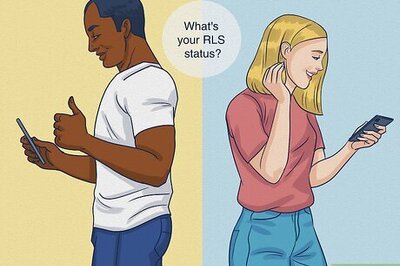
views
Calverton, (US): Seconds after she announces her presence in an online chatroom, the girl is besieged by a half-dozen men who want to know more about her.
''r u a virgin?'' one man asks, after about a dozen quick exchanges that begin with her age (13) and why she is home on a school day (illness).
The edgy online banter is taking place in an AOL chat room ostensibly for women who like older men, but known as a forum for men who want to make contact with girls. The supposed 13-year-old in this case, though, is not a child, but an undercover FBI agent who is working out of the bureau's main child pornography unit in a suburban Washington office park.
The demonstration for an Associated Press reporter was intended to show off the FBI's growing effort to fight child pornography, which has yielded increases of more than 2000 percent in arrests and 350 per cent in federal prosecutions over 10 years.
Agents use chats and other more private exchanges to seek out potential pedophiles and pornographers. Another man who believed he was talking to a 13-year-old asked how old she likes her men, then, ''virgin?'' The agents save transcripts of the online conversations, photographs that get exchanged and telephone numbers that are revealed, intentionally or not.
These introductory conversations, in some cases, lead to illegal activity; but the ease with which they're made show how large a problem looms. Child pornography is frighteningly easy to find on the Internet—images are traded freely, children are lured into dangerous situations and sexual abuse of children as young as infants is available on demand.
Finding people who want child pornography “is like shooting fish in a barrel,” said Stacey Bradley, an FBI supervisory agent in the Innocent Images unit.
One out of every five children ages 10 to 17 receive sexual solicitations online, according to the National Center for Missing and Exploited Children.
“The Internet is a great place, but there are certain parts of town you don't want to be,” said Arnold Bell, chief of the FBI's Innocent Images unit.
There is wide agreement that images are proliferating and that peddlers of child pornography are becoming more savvy to counter the enhanced police effort to combat it.
Orin S Kerr, a George Washington University law professor and expert on computer crime, said investigators posing as children typically steer clear of unfairly entrapping people on the other end of their online conversations by taking a passive approach.
PAGE_BREAK
“If agents are careful, entrapment never needs to come up. They take a suggestive screen name, go into a chat room and wait to be contacted. The screen will light up,” Kerr said.
He said he was aware of only one case that was tossed out of court in which a state investigator, posing as a mother, was found to have improperly lured the defendant by aggressively pushing him to get involved with her children.
More often, authorities struggle to keep pace with the availability of sexually explicit pictures of children and a lingering view among the public that what advocates and police call child pornography often is women dressing up to appear younger, said Ernie Allen, the missing and exploited children center's president.
The real danger that child pornography presents, shown in several recent cases of sexual abuse that have come to public attention, ''is a phenomenon that American and the world has only begun to understand, '' Allen said.
Attorney General Alberto Gonzales recently called attention to the issue in a speech filled with graphic images that he said was necessary to get the nation's attention.
On a recent day in the FBI unit, a working group that includes police officials from several countries was working a major investigation that appeared to reach into most states and dozens of countries, according to pins that were stuck into maps on the wall. Bell, the unit chief, would not discuss the investigation.
Several agents acknowledged that they can get discouraged by the volume of images and the number of people who appear eager to see them. Bradley, the FBI supervisor, estimated that 80 percent of the customers for child pornography are in the United States.
“But even if I stop just one person from getting molested, it makes a difference,” she said.
The undercover agent chatted with one man for more than an hour. She tried to stay in character with frequent use of the word ''like'' and alternate spellings that produced ''kewl'' for cool.
This man sent a photograph, ostensibly of himself, showing a balding man with a mustache and beard. He said he had three grandchildren and asked whether the 13-year-old had a computer in her bedroom, a setup that would allow her easier access with less parental interference.
While this man mainly avoided risque questions and answers, the undercover agent regarded him as the most promising prospect for engaging in darker, possibly illegal exchanges, should they meet again online.




















Comments
0 comment